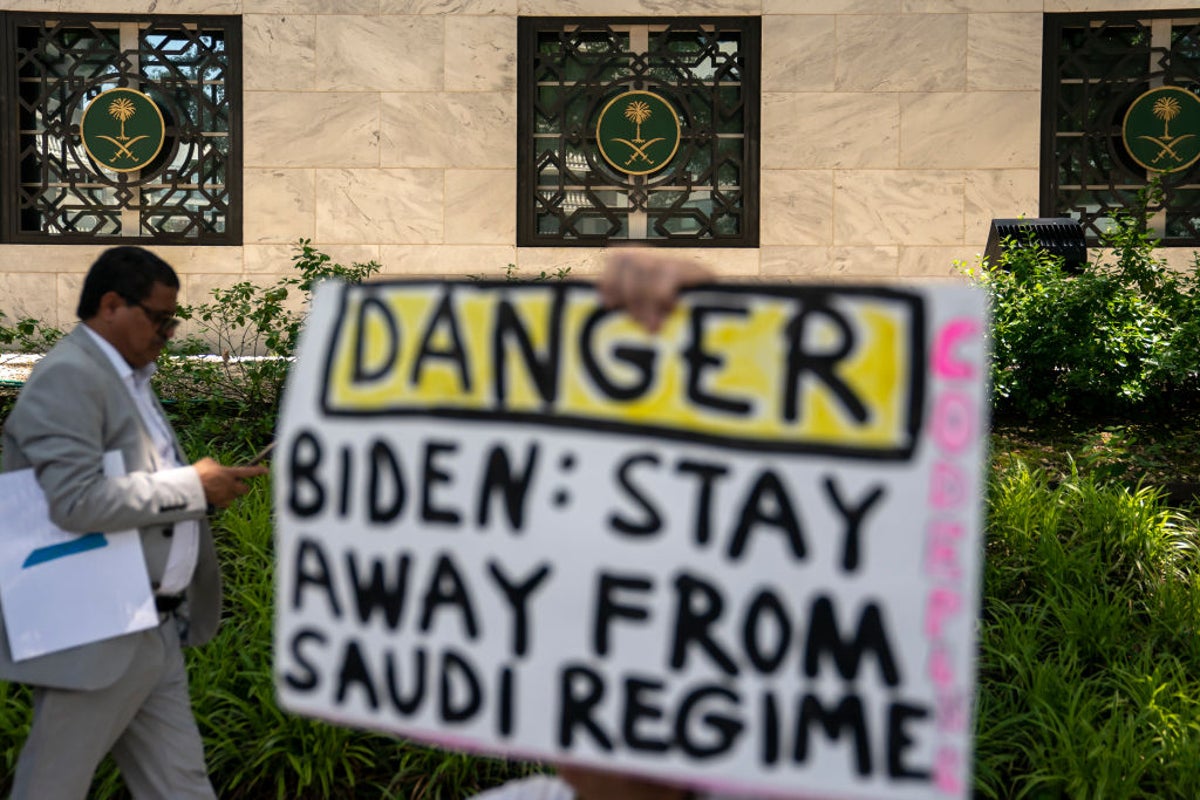
Joe Biden will touch down in Saudi Arabia on Friday in a move that will bring an unceremonious end to his campaign promise to make the wealthy Gulf state a “pariah” in the global community.
The president’s visit, which he attempted to explain in a Washington Post op-ed and through a statement from his press secretary last month, is a clear reversal of his onetime vow to make the Kingdom pay for the murder of Jamal Khashoggi, a Washington Post columnist critical of the Saudi crown prince, Mohamed bin Salman.
A year and a half into his White House term, Mr Biden’s evolving view on Saudi Arabia remains one of the starkest differences between Joe Biden the president and Joe Biden the presidential candidate.
“We [will] in fact make them pay the price, and make them in fact the pariah that they are,” Mr Biden vowed in a late 2019 debate with his fellow Democratic primary contenders.
Saudi Arabia remains a sore spot for progressives, who continue to call for Mr Biden to take a stronger stance against the country in particular over its brutal war against Houthi separatists in Yemen.
Now more than a year after he declared that the war in Yemen “must end”, Mr Biden is set to have a “bilateral meeting with King Salman and his team”, according to the White House, including the controversial crown prince. In 2019, Mr Biden directly accused the crown prince of ordering the murder of Mr Khashoggi. The leaders are expected to discuss the UN truce in Yemen as well as other issues, though Mr Biden has said that he will not directly ask the Saudis to increase oil producton.
That may be because Mr Biden vowed specifically in October 2020: “Under a Biden-Harris administration, we will reassess our relationship with the Kingdom, end US support for Saudi Arabia’s war in Yemen, and make sure America does not check its values at the door to sell arms or buy oil.”
The meeting is part of Mr Biden’s attendance of a Gulf Cooperation Council summit, but will undoubtedly be the main focus of his visit to the country and could precede a further announcement regarding the cooling of relations with Saudi Arabia.
“I know that there are many who disagree with my decision to travel to Saudi Arabia,” Mr Biden wrote in an op-ed titled, Why I’m going to Saudi Arabia, for the Post which meandered through the Biden administration’s foreign policy record before loosely addressing that question. “My views on human rights are clear and long-standing, and fundamental freedoms are always on the agenda when I travel abroad, as they will be during this trip, just as they will be in Israel and the West Bank.”
It’s still unclear if there will be any major developments made when the two leaders talk on Friday, but the visit itself surely means that the Kingdom is no longer the “pariah” that Mr Biden vowed to make it in 2019. And his willingness to meet with the crown prince, whom he has essentially called a murderer on several occaisions, is an obvious sign that a “reassessment” of the US-Saudi relationship has indeed occurred.
That much was clear last month, when Mr Biden’s newly appointed press secretary Karine Jean-Pierre heaped some of the most glowing praise on the Saudi government that the White House has made publicly since the days of Donald Trump. Her remarks did not mention the murder of Mr Khashoggi, a resident of the DC suburb of McLean, Virginia, who was killed and dismembered by more than a dozen Saudi hitmen.
“The President appreciates King Salman’s leadership and his invitation,” Ms Jean-Pierre declared in June, adding: “He looks forward to this important visit to Saudi Arabia, which has been a strategic partner of the United States for nearly eight decades.”


.png?w=600)




